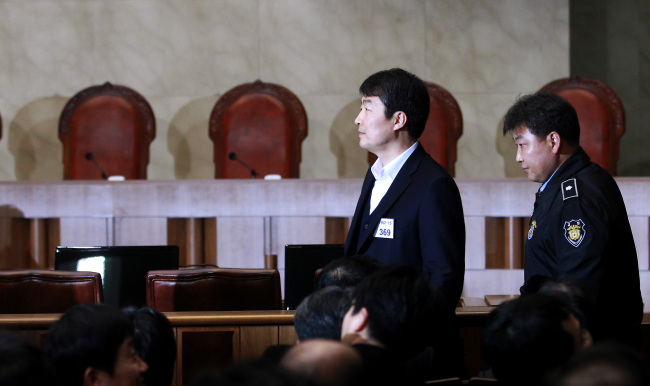Court upholds UPP jail term
Supreme Court acquits ex-lawmaker of plotting revolt, says existence of ‘RO’ unproven
By Korea HeraldPublished : Jan. 22, 2015 - 22:02
By Song Sang-ho
The Supreme Court on Thursday upheld a lower court’s decision to sentence Lee Seok-ki, a leftist former lawmaker, to nine years in jail on charges of encouraging a revolt and violating the National Security Law.
The court, however, acquitted the 53-year-old former legislator of the disbanded Unified Progressive Party of plotting a revolt. It said that the existence of the “Revolutionary Organization,” said to be the group that discussed the revolt, was based “merely on speculation,” and that there was no agreement among RO members to actually carry out the revolt.
The ruling came a little over a month after the Constitutional Court handed down an unprecedented ruling to disband the UPP on the grounds that the aim of the party was to ultimately realize “North Korean-style socialism” and ran counter to the basic democratic order of South Korean society.
“The defendants called for implementing concrete activities including destroying national infrastructure as forces in charge of revolution in the South while anticipating that a war would break out. Thus, this confirms their guilt of encouraging a revolt,” said the court in its ruling.
“But to constitute the crime of plotting a rebellion, the agreement on the targets of the rebellion and the actual danger should be recognized. But the evidence is insufficient to recognize that the defendants conspired to subvert the government or prepare for (a revolt).”
The Supreme Court on Thursday upheld a lower court’s decision to sentence Lee Seok-ki, a leftist former lawmaker, to nine years in jail on charges of encouraging a revolt and violating the National Security Law.
The court, however, acquitted the 53-year-old former legislator of the disbanded Unified Progressive Party of plotting a revolt. It said that the existence of the “Revolutionary Organization,” said to be the group that discussed the revolt, was based “merely on speculation,” and that there was no agreement among RO members to actually carry out the revolt.
The ruling came a little over a month after the Constitutional Court handed down an unprecedented ruling to disband the UPP on the grounds that the aim of the party was to ultimately realize “North Korean-style socialism” and ran counter to the basic democratic order of South Korean society.
“The defendants called for implementing concrete activities including destroying national infrastructure as forces in charge of revolution in the South while anticipating that a war would break out. Thus, this confirms their guilt of encouraging a revolt,” said the court in its ruling.
“But to constitute the crime of plotting a rebellion, the agreement on the targets of the rebellion and the actual danger should be recognized. But the evidence is insufficient to recognize that the defendants conspired to subvert the government or prepare for (a revolt).”

The court added that should the crime of plotting a revolt be constituted when there are only simple exchanges of views on a revolt, this could undermine people’s basic rights and freedom of thought and expression.
After his sentence was meted out, Lee, grim-faced and wearing a black suit, shouted towards his supporters in the courtroom, “Criminal justice has died!”
The court also upheld the lower court’s ruling to sentence six other former UPP members to jail terms ranging from three to five years on the same charges. The ruling came a day after the Justice Ministry vowed to establish legal grounds to forcibly disband “antistate” entities.
The main gate of the top court in southern Seoul was surrounded by police officers trying to calm down scores of members from both progressive and conservative civic groups, which underscored the country’s intense ideological division over the issue.
Left-leaning activists called for the release of Lee and other detainees, accusing the conservative government of politically branding them as “pro-North Korea,” while others demanded tough punishments for those supporting the communist regime in Pyongyang.
Lee was arrested in November 2013 on a set of charges including plotting an armed revolt by leading the RO. Lee has continued to deny the charges, claiming the judicial process against him was “politically motivated” to suppress liberals.
The rebellion scandal broke out in August 2013 after agents from the National Intelligence Service raided the homes and offices of Lee and nine other UPP members on suspicion of plotting to subvert the government during RO gatherings that year.
Last February, a district court sentenced Lee to 12 years in jail, convicting him of conspiring to overthrow the government, encouraging a revolt and violating the National Security Law. The six other members of the RO were also convicted, receiving jail terms ranging from four to seven years.
Six months later, the appeals court reduced Lee’s jail term to nine years, acquitting him of plotting a revolt. The court said that the claim regarding the existence of the RO ― which allegedly conceived of staging a revolt ― was based only on an informant’s speculation.
During court proceedings, prosecutors have revealed the transcripts of the two gatherings in May and December 2013, at which RO members allegedly talked of “revolution” and a plan to destroy social infrastructure. Lee’s side has argued that the transcripts were tampered with and cannot be adopted as court evidence.
(sshluck@heraldcorp.com)
-
Articles by Korea Herald







![[KH Explains] How should Korea adjust its trade defenses against Chinese EVs?](http://res.heraldm.com/phpwas/restmb_idxmake.php?idx=644&simg=/content/image/2024/04/15/20240415050562_0.jpg&u=20240415144419)











![[Today’s K-pop] Stray Kids to return soon: report](http://res.heraldm.com/phpwas/restmb_idxmake.php?idx=642&simg=/content/image/2024/04/16/20240416050713_0.jpg&u=)